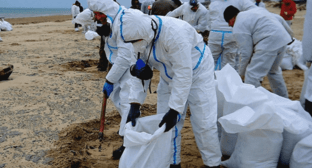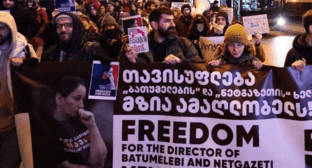17 April 2008, 13:51
People in Kabardino-Balkaria approve Putin's instructions to support Abkhazia and South Ossetia
The public of Kabardino-Balkaria is positive towards the orders issued by Russian President Vladimir Putin on rendering subject support to Russian citizens living in Abkhazia and South Ossetia.
Ramazan Sugkoev, Chairman of the Ossetian Cultural Centre in Kabardino-Balkaria, said: "For many years, we observe the situation in South Ossetia, we are distressed with the future of the region; therefore, we took these steps as a large positive step towards solution this complicated problem."
The "Caucasian Knot" correspondent reports that Mr Sugkoev also said that recently he had sent, on behalf of the Ossetian Diaspora in the Kabardino-Balkarian Republic (KBR), a cable to Boris Gryzlov, in which he expressed support of the appeal of the Parliament of South Ossetia on recognition of the independence of this Republic.
"We don't understand the position of the West," Ramazan Sugkoev went on, "where they profess the principles of democracy, but at the same time behave so non-democratically in relation to these two small subjects, which are striving for their recognition by the world community for so many years."
"Neither the Abkhazian nor the Ossetian people ever expressed their desire to be a part of the Georgian Soviet Socialist Republic (GSSR). They were forced there by Stalin and Beriya. They were parts not of the independent Georgia, but of the GSSR only so far as Georgia was a part of the Soviet Union.
With collapse of the USSR, neither Abkhazia nor South Ossetia had any obligations towards Georgia. But this is not all as well. Georgia quitted the USSR by having broken the Union's legislation on the order of a Republic's exit out of the Soviet Union, which stipulated that the autonomies, and Abkhazia was such in those days, shall have the right to decide on their future independently," Ruslan Keshev said.
"Besides, in 1991 Georgia resumed its 1922 Constitution. I'd like to remind that Abkhazia was not inside Georgia then. Thus, we see that Georgia has no sound arguments at all in support of its claims for Abkhazia.
As to the principle of inviolability of frontiers, it was adopted by the outcomes of World War II and treated exclusively the inviolability of the borders in Europe. And with recognition of Kosovo, it's just incorrect at all to talk about the principle of inviolability of frontiers," Mr Keshev has added.
Author: Luiza Orazayeva, CK correspondent




